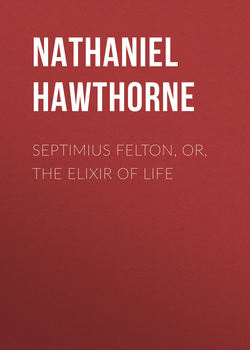Septimius Felton, or, the Elixir of Life

Реклама. ООО «ЛитРес», ИНН: 7719571260.
Оглавление
Nathaniel Hawthorne. Septimius Felton, or, the Elixir of Life
Introductory Note
Preface
Septimius Felton; Or, The Elixir of Life
Отрывок из книги
The following story is the last written by my father. It is printed as it was found among his manuscripts. I believe it is a striking specimen of the peculiarities and charm of his style, and that it will have an added interest for brother artists, and for those who care to study the method of his composition, from the mere fact of its not having received his final revision. In any case, I feel sure that the retention of the passages within brackets (e. g. p. 253), which show how my father intended to amplify some of the descriptions and develop more fully one or two of the character studies, will not be regretted by appreciative readers. My earnest thanks are due to Mr. Robert Browning for his kind assistance and advice in interpreting the manuscript, otherwise so difficult to me.
These three young people were neighbors' children, dwelling in houses that stood by the side of the great Lexington road, along a ridgy hill that rose abruptly behind them, its brow covered with a wood, and which stretched, with one or two breaks and interruptions, into the heart of the village of Concord, the county town. It was in the side of this hill that, according to tradition, the first settlers of the village had burrowed in caverns which they had dug out for their shelter, like swallows and woodchucks. As its slope was towards the south, and its ridge and crowning woods defended them from the northern blasts and snow-drifts, it was an admirable situation for the fierce New England winter; and the temperature was milder, by several degrees, along this hill-side than on the unprotected plains, or by the river, or in any other part of Concord. So that here, during the hundred years that had elapsed since the first settlement of the place, dwellings had successively risen close to the hill's foot, and the meadow that lay on the other side of the road–a fertile tract–had been cultivated; and these three young people were the children's children's children of persons of respectability who had dwelt there,–Rose Garfield, in a small house, the site of which is still indicated by the cavity of a cellar, in which I this very past summer planted some sunflowers to thrust their great disks out from the hollow and allure the bee and the humming-bird; Robert Hagburn, in a house of somewhat more pretension, a hundred yards or so nearer to the village, standing back from the road in the broader space which the retreating hill, cloven by a gap in that place, afforded; where some elms intervened between it and the road, offering a site which some person of a natural taste for the gently picturesque had seized upon. Those same elms, or their successors, still flung a noble shade over the same old house, which the magic hand of Alcott has improved by the touch that throws grace, amiableness, and natural beauty over scenes that have little pretension in themselves.
.....
Before Septimius could reply or act,–and, in truth, the easy presumption of the young Englishman made it difficult for him, an inexperienced recluse as he was, to know what to do or say,–the drum beat a little tap, recalling the soldiers to their rank and to order. The young officer hastened back, with a laughing glance at Rose, and a light, contemptuous look of defiance at Septimius, the drums rattling out in full beat, and the troops marched on.
"What impertinence!" said Rose, whose indignant color made her look pretty enough almost to excuse the offence.
.....